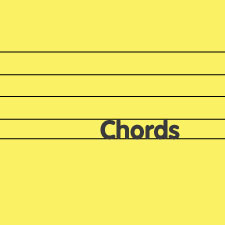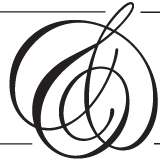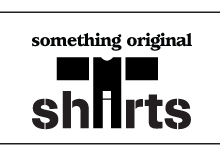
 |
Vol XXXV, ChordsMichael Patrick McSweeney |
Chords
(Lights up on a simple coffee shop setting. Three tables, one occupied by CHARLES and ED. An OLD MAN sits at the second, drinking milk. A WAITRESS cleans the third. Before the dialogue begins we see the WAITRESS pause in her cleaning
and stare at CHARLES for a while. She is behind CHARLES. ED notices, smiles, but does not address it.)
CHARLES:
What's more beautiful, the human voice or a piece of art?
ED:
Does it matter?
CHARLES:
I guess not.
(Beat.)
I say the note.
ED:
What makes you say that?
CHARLES:
Well...it was the first thing to exist for more than itself.
ED:
(Laughs.) What the hell does that mean?
You have no idea what you are talking about.
CHARLES:
Well, think about it. Music is ritualized voice, right?
(MAN #2 stares.)
Humans learned to speak, slow at first, defining what things were--
making them permanent. But every word had a reference point.
(He picks up a mug of coffee.) They had a word for this.
ED:
Addiction?
CHARLES:
(Laughing, shaking of the head.)
Perhaps an addiction to giving things substance;
if they hadn't, what would make sense in the world?
But giving names, titles, definitions...it wasn't art!
It wasn't beautiful.
It was either a thunderstorm or a rock or a child,
and nothing more.
People painted these things on the walls of caves,
Man was able to give it complexity
because he wanted to. Drawing back then --
you look at cavern drawings, men hurling spears at buffalo.
They drew it because they wanted to give permanence
to their existence. (He laughs, nervously.)
Sorry, drink your coffee. (Beat.)
Can I just explain what I've been trying to say this whole time?
It will only take a moment.
(ED nods. CHARLES takes a long sip of coffee.)
Man started out with just his voice.
(MAN #1 sings a open vowel, any note.)
It gave him the ability to express one level of emotion:
happiness, grief, surprise, fear...but was it.
He could only articulate his words--whatever those were--
and put some kind of emotion behind it.
ED:
Think about this:
could he even grasp what those emotions were?
Chances are early humans just stared at the sun all day,
blinded by its overwhelmingly bright existence.
Most of them probably did go blind--
CHARLES:
There must have been false starts.
There must have been cultures--without writing!
Think about the first cars:
no more than horseless carriages,
monstrous black holes of gasoline or kerosene
or whatever those things ran on.
Most of them probably broke down
when the rain started to fall or when it snowed
or the wind was too forceful.
But it was a start.
(CHARLES takes another long sip.)
So each person could vocalize this one tone,
one word, one image.
But it was more than just an image!
The human voice gave meaning
to whatever the voice was trying to define.
When someone said “home”
with warmth and longing, you would know why.
If they spoke the same word
with fear and reluctance,
it would create in image in your mind.
(He takes another swig of coffee.)
And the voice, unlike a piece of art,
can co-exist with another.
People speak together...
they form...
(He waits, makes a gesture towards ED.)
BOTH:
...harmony. (CHARLES sounds excited; ED reluctant.)
CHARLES: (Immediately.) Harmony!
The synthesis of two sounds
that twist and expand each other
like wind against a body of water.
Think about what we just did.
We said the word together, but we didn't say it
the same way. I was excited, committed,
invested in the harmony.
But you were unsure of what I was going to say.
ED:
But I had an--
CHARLES:
Idea? A notion?
You could speculate, guess,
perhaps with the closest certainty--
but you had no way of nothing what I would say,
or, more importantly, what I would say.
And after we shared that harmony,
it was over.
And we can never have this conversation again.
ED:
We could talk about it.
CHARLES:
(Laughs.)
But it wouldn't be the same.
(He takes another swig of coffee.)
We could even say that word again.
Come on, lets try it.
BOTH:
Harmony. (CHARLES says it bemusedly.
ED imitates CHARLES' earlier enthusiasm.)
ED:
(Laughing.) And it will never be the same again.
CHARLES:
But this--(He gestures around absently,
referencing "the wider world".)
--is all hypothetical, nothing more
than a buzzword implying unity.
But the unity is there...you just have to listen.
ED:
To who?
CHARLES:
(The WAITRESS starts to walk out
with the OLD MAN's check.)
To everyone! People on the subways
reading books, men who hold their cell phones
and women who move in packs.
They're all saying something, harmonizing,
crafting chords--even when they aren't speaking.
Those little moments when someone falls down...
everyone cries out with every movement of finger
and quiet lip, waiting for someone to say--
CHARLES and WAITRESS:
Here. (Beat. THE OLD MAN tries to get up.)
CHARLES:
Let me give you a hand.
WAITRESS:
(She speaks just after CHARLES starts.
She helps the OLD MAN to his feet.)
Let me give you a hand.
CHARLES:
It's that moment of connection people want.
To look across a street and feel a pair of eyes,
foreign or known, against their own.
They want their minds to shatter
the way that thick glass does.
They want--
CHARLES and WAITRESS:
(The WAITRESS drops the empty milk glass.)
Shit!
CHARLES:
(Continuing with no break from the previous word.)
--like, how the hell--(He stops, turns to look at the WAITRESS
cleaning up the glass. He waits, as if he considers
assisting her. When he speaks, he starts slow.)
How do you even define what people
want? Is there one thing?
That can't be true--we have politics--
but I think people just want connection,
to know something outside
of their sphere of comfort.
(He sighs, picks up the mug quickly
to take a sip, but finds its empty.)
Damnit.
ED:
Addiction.
CHARLES:
(Laughs, raises the mug.)
To the beauty of music.
ED:
(Raising his own.)
To black coffee, bitter like an old cat.
CHARLES:
To a mocha double-espresso.
ED:
(He drains his mug.)
Are we done here?
CHARLES:
I think so. It was nice meeting you.
(They shake hands.)
We should do it again sometime.
ED:
Yeah, sure, just call me. (They rise,
take out their wallets,
and start piling money on the table.
The WAITRESS comes over, collects it,
walks off-stage.)
You know, you should have asked her
for her number. I saw her looking at you
earlier.
CHARLES:
(He laughs.) Too late.
(Lights down as they exit.)




